Duck Pest Control – Working with Ducks in the Garden
This post may contain affiliate links. Read my full disclosure here.
I read a permaculture article that said slug issues in the garden weren’t due to too many slugs, but to a lack of ducks. That’s what triggered the purchase of the Duck Patrol. Some of you know our duckies from other posts or their Instagram feed.
In this article, we’ll talk specifically about using duck pest control in the garden. We’ll share why we chose the breed that we did, how to train your ducks, and tips for managing your pest control crew.
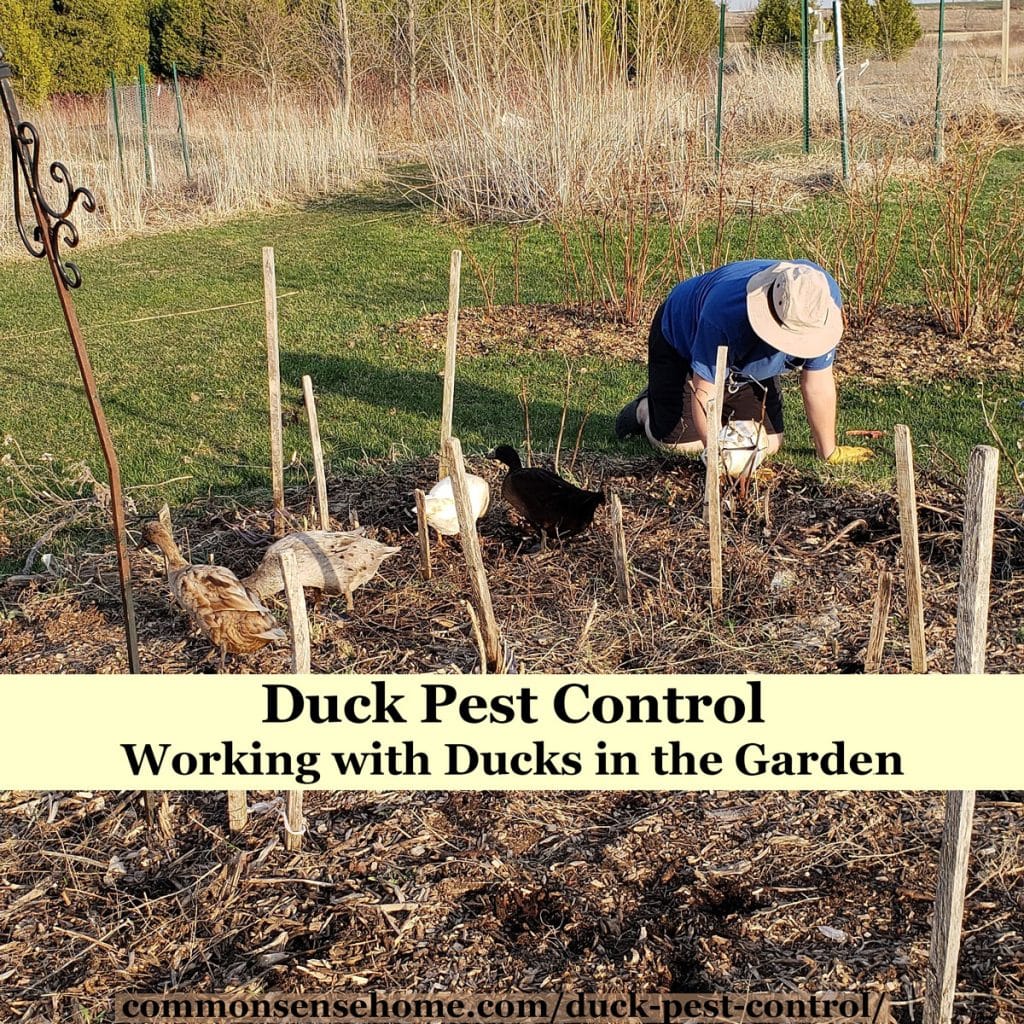
The Best Ducks for Pest Control and Egg Laying – Runner Ducks
Runner ducks are my favorite duck breed for pest control. With a quick online search, you’ll find examples of them being used for pest control in vineyards and rice paddies. They love to forage, and are also some of the best layers. Anconas, Campbells, Welsh Harlequins, magpies, runners, moscovies (technically not ducks) and various bantam breeds are also good foragers.
As a smaller, lighter duck breed, runner ducks are less likely to smash and damage plants while moving around. Because they don’t have the weight to maintain of the bigger duck breeds, less supplementary feed is needed. They are not extremely cold tolerant, but there are few bugs for them to find in winter. Temps below 20°F will have the crew inside most of the day.
We ordered our crew from the hatchery, and picked four ladies and gent to have a stable flock. There are four different varieties of runners in our crew, so it’s easy to tell them apart at a glance.
Keep in mind that the size of your flock should be matched to the size of your garden. Our crew of five does a good job covering over an acre of garden and orchards. For a small garden, a pair of ducks can get the job done without being lonely or getting into too much mischief. Don’t get a single duck. They are social birds.
The video below shows the ducks on patrol, from their first visit to the garden as ducklings to adulthood. (If the video doesn’t display, make sure adblockers are off.)
Training the Ducks for Garden Pest Control
Most ducks are skittish. This helps keep them safe from predators, but makes them challenging to handle. Our crew gets petted and/or handled each night as part of their bedtime routine. They still don’t like it very much, but it’s been very useful when they need to be handled. Miss Blue, Miss Chocolate and Miss Emerald all required some extra care during the past couple years. We also talk to them and sing to them, so they know our voices.
Next up – following us around. Initially, we took them for short visits into the greenhouse and closed garden beds. Dunc and I weeded and talked with the duckies, and they’d stay by our sides and look for bugs. You might say we were surrogate mamma ducks.
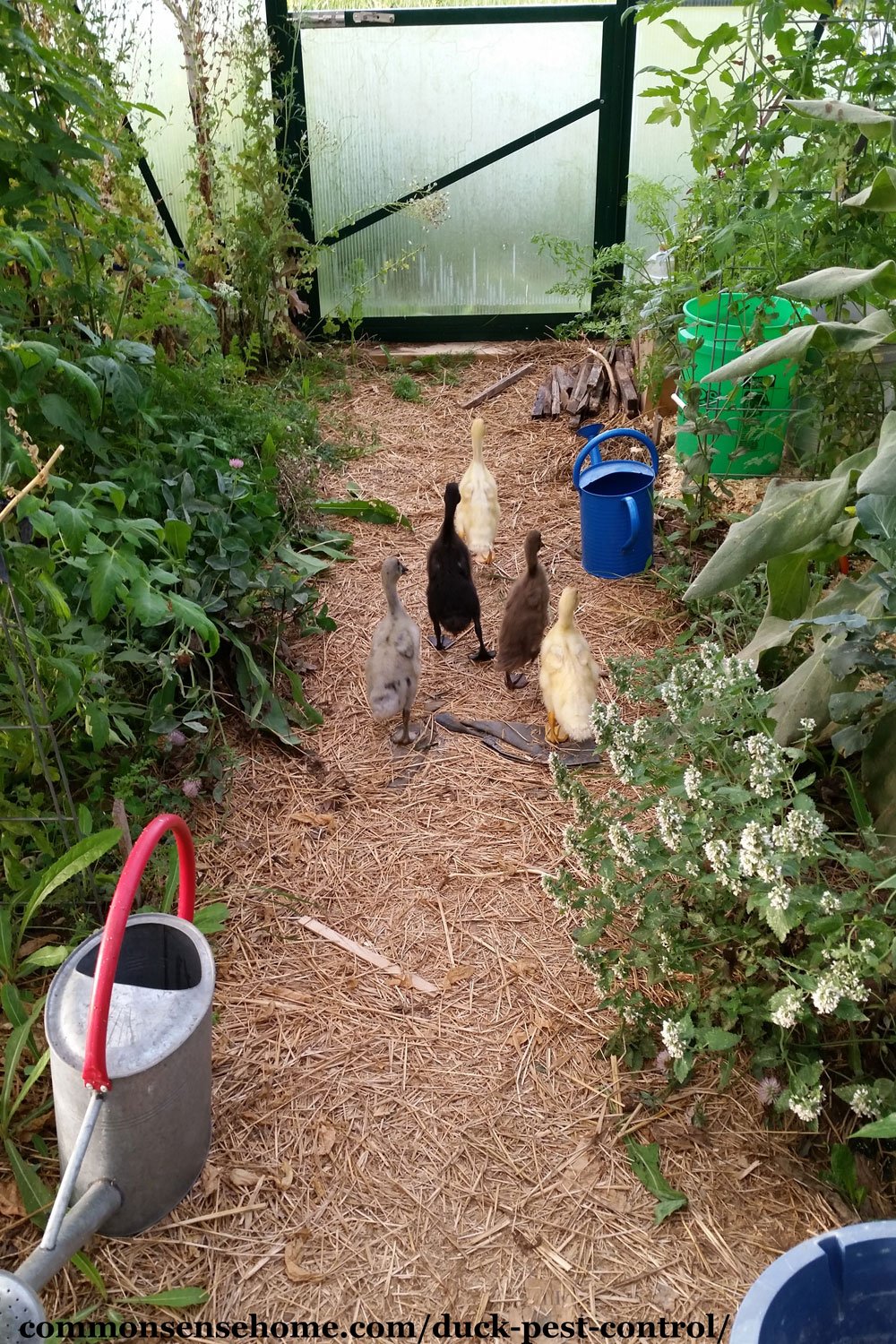
As they grew, we took them out each morning to forage in the gardens while we gathered weeds for the chickens. This is when we introduced the whistle. We keep boards in the garden to mark paths – they also make a great spot for slugs to hide. We flip the boards over, and then whistle to get the ducks’ attention. They run over and have a slug feast. Now they know when they hear the whistle, it’s treat time.
Initially, they worked side by side with us in the garden, and then went back to their pen or the duck tractor. When they got a little older, they had free range time mornings and evenings. Now they free range all day long.
Whistles and Rewards
Just like when dealing with kids and other pets, consistency is key with duck training. We never give the whistle without a reward at the end. When working in the garden, the reward is the garden pests. If they’re coming in at night or putting up with being petted, the reward is freeze dried meal worms sprinkled in their water basin. (We also spread a few around the greenhouse for them to hunt in winter.) They also enjoy chopped tomatoes.
In winter, they get some meal worms in their water in the morning and at bedtime. In summer, they only get their bedtime treat, as a reward for coming in and putting up with petting time. (Most mornings they run out the door immediately to forage, so the treats aren’t missed.)
While they have access to ten acres and pond, they still spend a good amount of time working the gardens and orchards. More often than not, if we’re working in the garden, we have duckies hunting bugs right by our side.
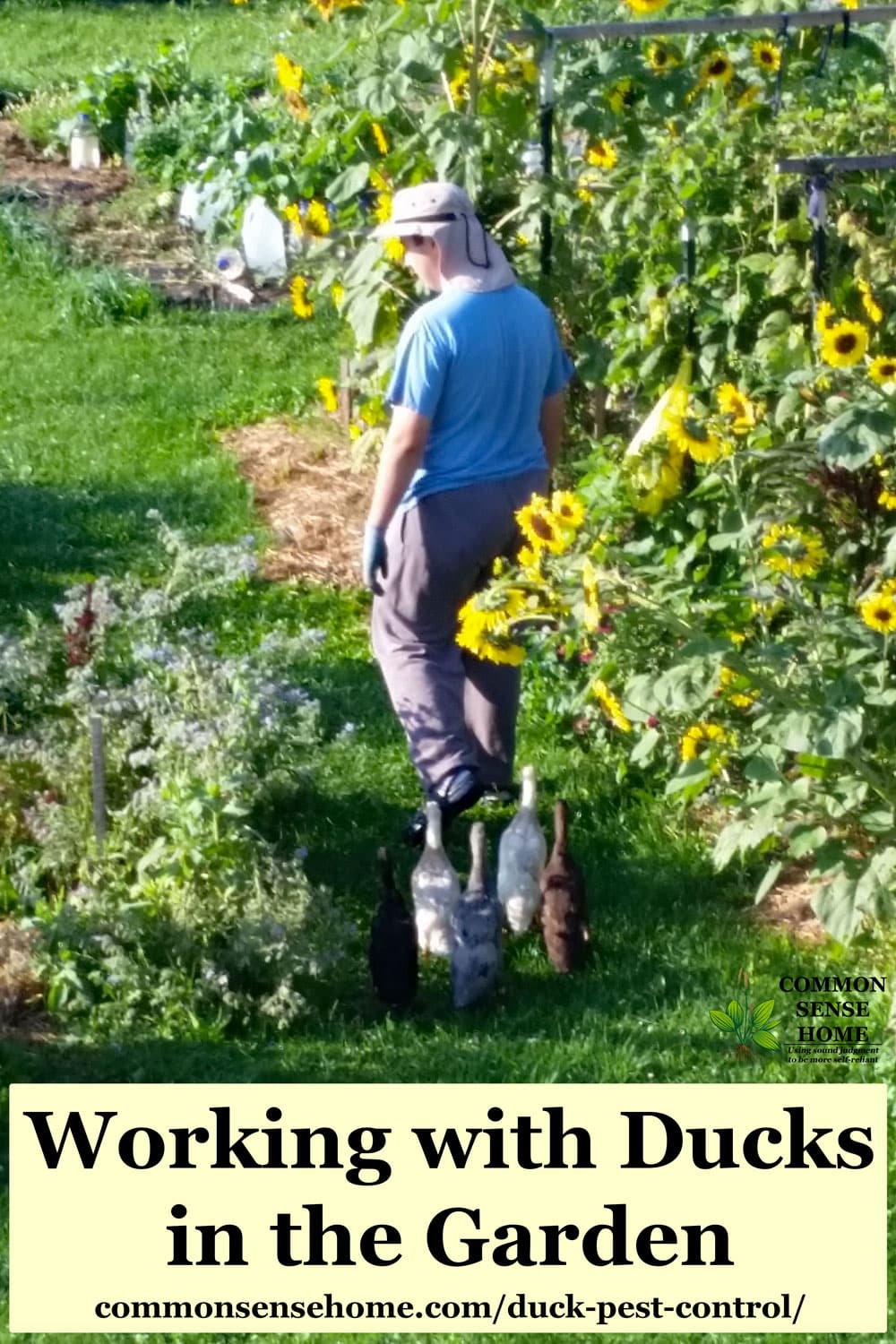
Would you like to save this?
Tips for Working with Ducks in the Garden
Ducks don’t dig up the garden like chickens, but there are a few things you need to keep in mind when you use duck pest control.
Ducks love leafy greens and some seedlings. Our crew’s favorites are lettuce and Swiss chard, but the will happily nibble a variety of small greens. They also enjoyed sampling onion and pea seedlings, and baby brassicas. Once plants are larger and more established, a little nibbling won’t hurt, but for small plants, it can wipe them out.
I suggest keeping the ducks away from these plants (peas, onions, cabbage family vegetables) until the plants are at least half grown. With salad greens, it’s probably best to keep a fence or other barrier between the duckies and the greens.
We also trellis our tomatoes to keep most of the fruit out of easy reach of the ducks. Tomatoes typically ripen from the bottom up, so we might need to protect the plants at first, then let the ducks have access later in the season.
Not only will they happily eat your salad, duckies poop – frequently. It’s best to avoid that near foods that are eaten raw.
If you’re nervous about having any duck poop directly in the garden, create a duck run around the garden. Slugs are attracted to duck poop. The ducks patrol the perimeter of the garden, and the slugs are drawn out of the garden towards the duck poop – where they are munched by the ducks.
You’ll keep the ducks away from temptation, and avoid the risk of duck poo on your raw veggies. You won’t get the same level of pest control that you’d have with them directly in the garden, but it should still help.
Ducks love to twiddle. If your ground is muddy or you have standing water in the garden, ducks will revel in it. They love burrowing their bills into mud, and flushing water through their bills. This is great for clearing mosquito larvae and other pests, but it does make a mess.
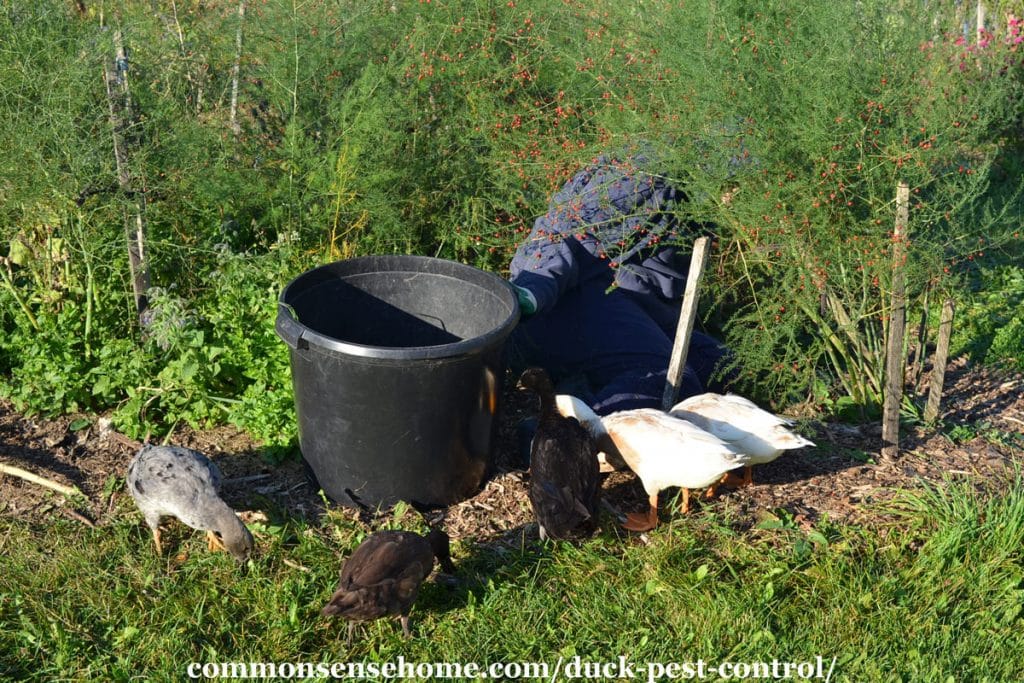
We Love Our Duckies – But They’re Not for Everyone
Our ducks have given us many hours of joy simply watching them, and done wonders for reducing the slug and bug populations. That said, they’re not for everyone. In a tiny urban yard, their urge to play in the water and mud may make too much mess for the area.
They can also be LOUD. Buff, like other drakes, talks in a quiet, raspy quack. The ladies also engage in polite chatter, but sometimes they “let ‘er fly” with round after round of brassy, sassy quacks. Here, we don’t have close neighbors, so it’s not an issue. In a suburban or urban setting, it might be a problem.
Do you have more questions or comments about using ducks for pest control? Leave a note below and share your thoughts.
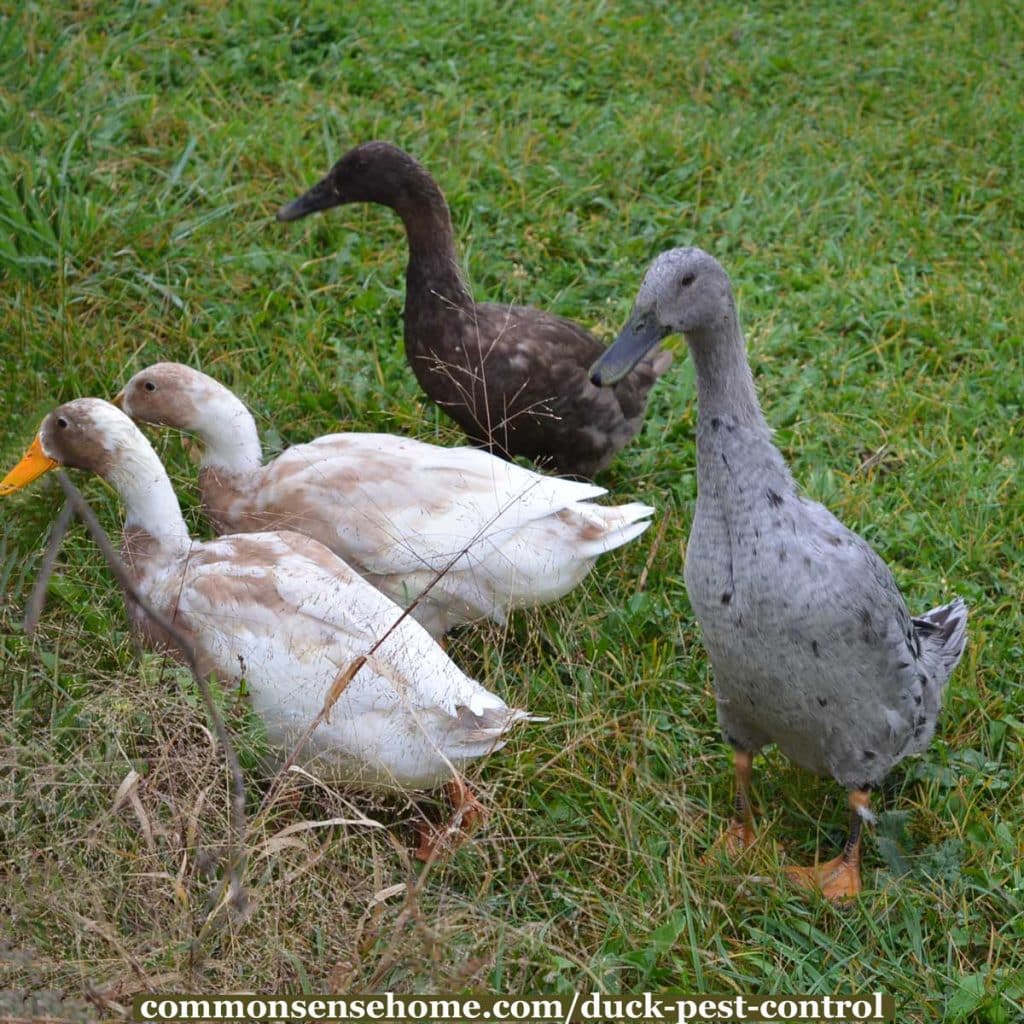
More Backyard Poultry Information
We’d love to invite you to have a look around the site. There are a number of articles on backyard poultry, all listed on the Common Sense Homesteading page, including:
- Homestead Geese – Easy to Care for Barnyard Protectors and Weed Eaters
- The Small Scale Poultry Flock
- Quick Lock Chicken Door – Predator Resistant, Easy Latch Open or Closed
- Do Ducks Need a Pond?
- What Do Ducks Eat?
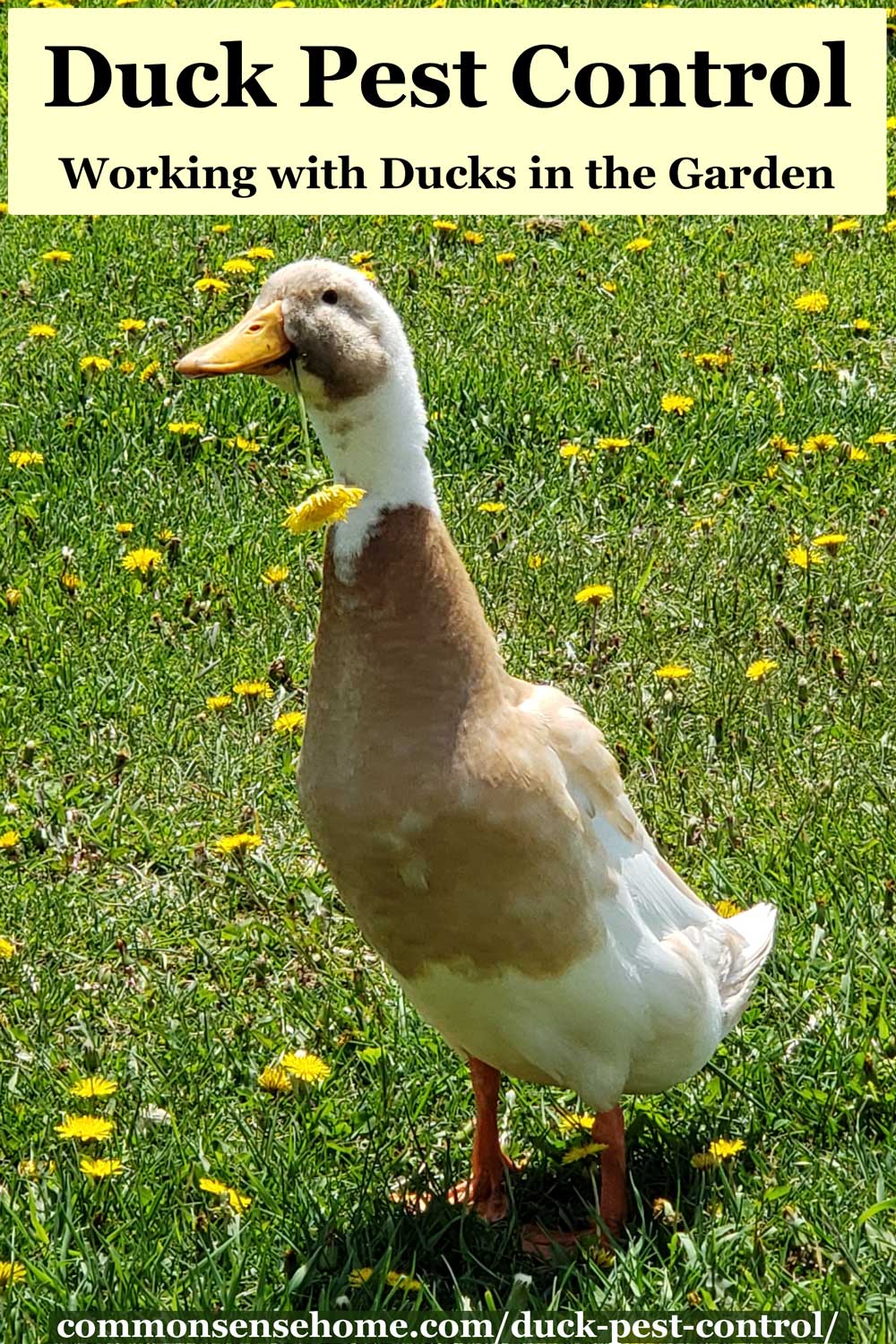


Am campaigning to add ducks to our homestead!
Did not see any links for a video, do not have ad-blocker.
Wonderfully charming article, with well-stated qualifiers.
I know roosters are pretty territorial about their hens. Are ducks this way, and if so, how many ducks per drake?
What are the limits of duck tolerance for heat (with water access), and cold? A typical winter takes us down into subzero often, and sometimes to -35 F. How well insulated is your duck house? How much cold protection does their winter run have?
Am curious about the quality of duck poop for compost. Will deep bedding work, or is it better to muck out regularly?
I have seen recommendation for turnip greens as winter fodder for various livestock including poultry. Have you tried this for your ducks or hens? If so, any precautions?
Hmmm… not sure why video is not displaying. I double checked and it is in embedded in the post.
The drakes will jockey for position and favor with the ladies, but they aren’t usually as aggressive as roosters can be. (I’ve never seen blood drawn, and they don’t have spurs.) Originally, we had one drake with four hens. Mr. Buff seemed a little overextended keeping track of all four ladies, so two or three hens may have been better. After two rounds of setting eggs to hatch and two rescue ducks, we now have 6 males and 8 females, which is a little heavy on males, but they generally get along.
Our runners will go outside while temps are in the 20s, but once temps drop into the teens they don’t like it and stay in the coop or attached greenhouse. The area of the building they are in now has insulation on the exterior walls, but none above. We use a fairly deep layer of bedding so they can snuggle in. I will generally add a heat lamp if temps drop to around 10 below zero or lower overnight. The attached greenhouse has multiwall polycarbonate but is otherwise uninsulated and unheated. We give them water in a bucket set in a basin when they are inside to contain the moisture/mess, and swap it out as needed so they have fresh water.
Because our duck flock has outgrown their space, we use deep bedding, but do spot clean a little each day so we don’t have to change all the bedding as frequently. They don’t dig like chickens will, so you’ll want to turn the bedding occasionally. Duck poop is not as “hot” as chicken poop, and does not need to be composted before adding it to the garden. We spread soiled bedding in garden beds and around various plantings in the yard.
I don’t see a problem with turnip greens, other than I can imagine the duck patrol chowing them down quite quickly. They enjoy most greens. Ours cleaned out all the kale and chard in the greenhouse the first day they were stuck inside. Now that they can get back into the main garden, they’ve been nibbling at the remains of broccoli and kale plants from last fall.
I have a pond in the middle of my garden but I don’t think it’s big enough to protect them from foxes. How do you protect them from predators?
Our ducks have a sturdy coop where they go in at night. During the day, we check on them regularly. Thankfully our foxes are usually well fed on rabbits and rodents. We did lose one girl a couple years ago, but I think that may have been an airborne predator, as she disappeared without a trace. We found 2 other girls hiding after the attack, one the same evening, and the other came home the next day.
Are these flocking birds? Can I get just three females, or do I have to get more? And do they need water to swim in?
Thanks for your help!
Ducks definitely prefer a flock. Some birds wander off on their own adventures for a short time, but they always get back together.
You could get just three females, but the ladies do like having a drake around. The drakes are also protective, and change the dynamics of the flock. Since I originally wrote this article, our flock has expanded to 14 birds. As they travel around the yard, the drakes keep up a quiet commentary, seemingly encouraging the flock to stay together and pointing out choice treats to the ladies. When any of the females get separated, they call out, and one or more of the drakes immediately deploy from the main flock for rescue and retrieval. If there are any strange drakes or other threats (we have a pond, so wild birds move through), the drakes will drive off the threat if possible, or move the ladies to a protected area. (We get birds of prey around, too, and the drakes move the flock under cover.) Drakes are usually less expensive, too, since more people want the females for egg laying.
Ducks don’t need a pond, but they do need enough water to submerge their bills and heads, since they have no tear ducts. It’s also very beneficial for them to have a basin large enough to bath in so they keep their oil glands active (this greatly improves feather health). During winter when our ponds freeze over, we fill a five gallon basin in the greenhouse daily for bathing. We helped process a small flock of waterfowl at a neighbor’s place that only had access to a drip waterer, and those poor birds were in terrible condition, with low weight, dry skin, and dull feathers.
For more detailed information on the water needs of ducks, see “Do ducks need a pond?“.
Hi! thank you for sharing!
I now think about adding ducks too. but how exactly do you keep them away from some of the young greens? from what I have seen in the photos of this post your garden beds aren’t specifically fenced in (or at all), much like mine. do ducks respect no-go-areas if trained??
All the best, Ruth
Hi Ruth.
We put temporary fencing up around areas where we need to keep the ducks out. We’ve trained them to come when called (most of the time), but I don’t think they could resist the temptation of some of their favorite snacks within reach.
We have the beds open to the ducks when working the soil, as they are great at cleaning up pupae, wireworms, and cutworms. We plant, then isolate/fence if needed. Once plants can handle tasting, or if they are plants that the ducks don’t bother, like potatoes, then we allow access again.
Hi!
Where I live, we have problems with stink bugs (several species of them). Are they on the menu of runner ducks?
In the times before the bird flu outbreak we used to have mute ducks. They would eat all the slugs, but I don’t know whether they ate stink bugs, because the populations of stink bugs weren’t that big in my region back then. They also liked to hang out in our backyard, and you were lucky if you didn’t step in their poop, since it is very liquid and spreads to around 10 cm by 10 cm and smells horribly. Do runner ducks also have that big and smelly poop?
I’m not sure about the stink bugs, but runner ducks do have messy poops at times. Sometimes their droppings are smaller and less smelly, but other times they are quite large and smelly.
Will ducks eat earwigs?
TIA
Ducks will eat earwigs if they can catch them. They tend to like to hide in crevices where it’s hard for the ducks to access them.
Will ducks eat all sorts of garden pests? We don’t have a slug problem here as much as we do cucumber beetles, squash beetles, borers. Thanks for the help!
They won’t eat everything, but they do like squash pests. We used to get a ton of squash bugs and quite a few cucumber beetles, and the ducks have virtually eliminated them. Borers are tougher to get rid of because the ducks can’t get at them once they are in the plant, but they will root for the larvae in the ground.
Our ducks don’t care for potato beetles or ants, but those are about the only pests they won’t nibble.
They “roost” on the ground I assume? What kind of nest boxes do you use?
Yes, ducks can’t perch, at least, not these ducks. We’ve provided various sheltered areas for them to lay (custom built nest shelters, cardboard boxes on their sides). Sometimes they use them, sometimes they randomly drop eggs around the coop or out in the yard, sometimes they hide them in spots around the yard. We found three of Fawn’s eggs in the sunchoke patch after frost last year.
I love your garden and your story and your lovely little ducks. What a wonderful ducktale! I would like to try this.
We are getting out first ducks, but I can’t find much in the way of raising ducklings online nor what to feed them. Mostly what I see is all about chickens. Can you help direct me?
Warmly,
ERin
Temperature needs are similar to baby chicks. Duckies must always have water to dip their bills into, but tend to be quite messy. We put their waterer inside another small dish to contain the mess.
When we first got our crew, we fed them high protein feed cut with some oatmeal, with some nutritional yeast mixed in. As they reached egg laying age, we switched to layer feed (still with nutritional yeast mixed in) and free choice scratch grains with oatmeal mixed in. We mix garlic and oregano in their feed at times, too.
They also get greens, and meal worms, and plenty of foraging time, and an assortment of other bits to sample from the garden. They love tomatoes.
For water in the coop now that they are bigger, they get a two gallon bucket set inside a big basin. Their food goes in the basin, too, so all the mess gets contained. Outside, they have a bucket with no basin and the food right next to it, which gets moved around the yard each day.
Loved your article on free range ducks! We had several Black East Indians in our back garden for around five years, feeding on all the slugs and breeding profusely! There are many pros and cons to keeping them; our breed were bantam size which was perfect for a smaller garden, and watching the eggs hatch has been a delight for us and the children! Yes they do poop everywhere, but the eggs were delicious and the ducklings were usually easy enough to sell to good homes; unfortunately we have acquired a serious urban fox problem due to locals actually feeding the foxes and letting them breed in their gardens, so subsequently all of our ducks ended up as dinner for the foxes. Unless they are securely couped up all day and night, there was no solution to the fox problem. In the end we gave up keeping ducks; our garden is greener, but our lives are poorer without them.
I’m so sorry you lost your ducks to thoughtless neighbors. I’m sure they were beautiful.